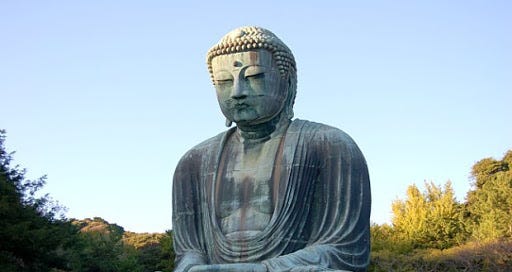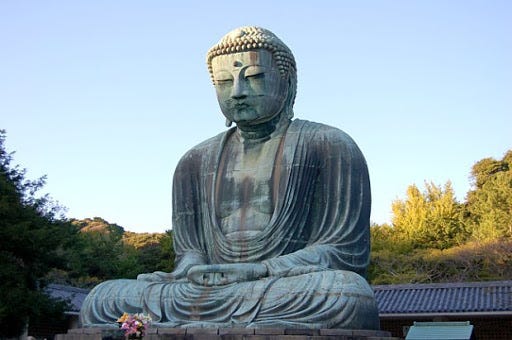Comments on Buddhism and Radical Politics
A brief collection of thoughts on the legacy of Buddhist studies and its impact on radical politics.
I find it rather interesting that at least from a position of radicalism, some have turned to those Buddhist traditions that are themselves more conventionally hierarchical, organized, and so forth. Be it Zen Buddhism or even various Vajrayana lineages, it is does appear that as far as Buddhism’s place in radical thought is concerned, there is a clear preference for particular traditions. This preference can be explained as a result of various factors, but I think two stand out especially. The first of which is the longtime emphasis of Buddhist studies towards Japanese forms of Buddhism, especially Zen, as a more 'refined' practice.
In particular, how Zen Buddhism is received as a religious body of thought and practice that is commensurable with contemporary science, western attitudes against what may be considered superstition, and so on. Of course, the main propagators (D.T. Suzuki, Alan Watts, and so on) fashion Zen practice in such a way that meshes with these attitudes. It was not as if these appeared disparately and merely the exoticism of an ‘Oriental’ philosophy, nor was it wholly due to intrinsic aspects of Zen that such a convergence was possible. If anything, the dissemination and transmission of Zen thinking was carefully constructed through institutions and various appeals to a Western rationalism, a Western attitude towards religion that by necessity required of it to be rationalist, logical, free and unfettered from superstitions of the sort.
As a result, the development of radical political currents and their encounters with Buddhism puts significant focus on Zen Buddhism, drawing upon an eclectic mix of practice and philosophical cherry picking that makes say, Zen anarchism, possible. This is not to say Zen anarchism is invalid, or that these are misguided practices, but rather it is a development through encounters that result in new, often affirmatory practices to give way to modes of life that are seen as liberating. Nothing wrong with that, until we look a little deeper into the turbulent history of things as they have played out.
However, this often results in an overemphasized commensurability with radical politics of liberation, to the point where history is emptied in favour of suitable tales - commensurable, digestible revisionisms of history. Just-so stories that ensure the practices and philosophy remain - rather ironically - sanctified and ethically pure. This is especially concerning when we look at certain philosophical currents in Zen that have manifested in the more authoritarian and nationalistic narratives extant in Japan, something that does not appear adequately elaborated upon in the study of Buddhism as a whole. Further irony when we look at certain figures in the westward transmission of Zen themselves were involved, complicit, or wholly supportive of a nationalistic mythos and exceptionality of Zen practice. D.T. Suzuki being one of many figures to be implicated in such activities. Thus, the specter of Japanese nationalism and its appropriation - or more damningly - integration and assimilation of Zen into their national narratives, remain as a dark uninterrogated underbelly. One almost seemingly absent in the sphere of radicalism, especially on a critical level.
From here, other traditions of Buddhism are cast by the wayside, and not just other Japanese traditions, but the traditions you would see practiced by laity in say China, Vietnam, and elsewhere. Cast aside due to a lack of translated foundational work (in part to a seeming lack of will to translate), cultural suspicion of their ‘earlier’ non-refined modes of practice, and so forth. These 'emptied histories' and attitudes carry over in the West. That is, Western Buddhism ends up inheriting much of the suspicion towards other traditions and schools of though, all the while asserting a "true" Buddhist practice. Such approaches to not just the study of religions and the application thereof towards political radicalism is myopic. Reeks of an essentialist assertion that there is one way in which things are to be done, to be believed, to be elucidated - predicated on suppositions from ignorance, claiming those other methods are ‘superstitions’ and the like. A totalizing image of Buddhism instead of Buddhism as an embodied, full mode of life.
Doing further research into specific Buddhist traditions and schools of thought beyond Japan, and especially as practiced by laity and the history of this practice, reveals a challenge to such approaches. Namely that Buddhism is not simply diverse, but these lay practices, lay methods of approaching the Dharma, have themselves been projects of political emancipation. Through the courses of Chinese, Korean, Japanese, and Vietnamese history, to name a few of the most notable ones, we see the use of cosmology - especially that of Buddhism and folk traditions - as a means to elucidate upon the righteousness or necessity of their struggles. In this light, engagement with the history of such struggles, revolts, and religious-political movements would lend to more cohesive applications of Buddhism towards a radical politics of emancipation.
Onto the second factor, primarily centering upon the Vajrayana lineages and their role in the Western milieu of Buddhism. I think here we see a similar trend, though one rooted in the politics of self-determination and the fascination of the West with the Oriental Other. Furthermore, I am almost certain that the engagement of practice in the West by Westerners (especially with radicalism in mind) only goes as far as a means of 'self-help' - nothing wrong with that - yet it leaves much to be desired when we consider the rich diversity in say, Tibetan Buddhism, is sparsely examined as a result. A similar tendency emerges where Vajrayana Tibetan Buddhism is given a privileged status for its cosmological insight, without much further interrogation into the ways such insights are interpreted.
Alternatively, this privileging of insight results in awkward applications to matters of personal identity and expression, often assimilating the Vajrayana perspectives within conventionally Western philosophical approaches. For all intents and purposes, this assimilation by supposed sameness, by parallelism, is something that results in a confused and often suffocated interpretation and application. One with a meta-level consequences where the philosophies of both traditions become vulgarized, and oft dismissed as a result. Furthermore, another consequence of such assimilation of practices, philosophy, inquiries that would otherwise be incommensurable to an audience that suggests that somehow, these people from the Himalayas got it all right. A glaring Orientalism that hides in exceptionalism, in the tokenism of political self-determination.
So back to Buddhism more broadly, radicalism, and all that jazz. Any engagement with a diverse tradition cannot be total, rather, to situate Buddhism within radical politics is to recognize pluralism as the reigning Dharma. That is to say, there are many paths to enlightened, unfettered, emancipated life. Rather than suggesting a tradition's commensurability with say anarchism, it is better to affirm the necessity of deep investigation and inquiry, examination of practice and thought. Skillful means as not merely a method of expounding the Dharma but the internalization and learning the Dharma through experience itself. As such, I saw it fit to reorient my investigations into the Buddhism of the commons, of the lay practitioner - such as Tiantai and Pure Land - as the focal point of radicalism. Not because of their role as the traditional means laity can best emancipate themselves, but as a result of how their philosophies, institutions, and historic developments reflect and may embody themselves through a practice of moving towards emancipated life. Reorienting the questions where they may be answered by a turn towards lived practice, lived experience, and working from the bottom-up how such engagement may develop towards radicalism.
For all intents and purposes, I think most studies into Buddhism in recent decades have moved towards this sort of approach. A greater concern for the anthropology of practice, the embodiments of philosophies, and the diverse history of Buddhism as a whole. Such shifts are a welcome development. However, on the side of radical politics, there appears to be that shadow, the shadow of privileged scholarship and suspicion that lingers. Somehow, it appears that Buddhist radical politics are stuck in the crux of New Age Leftisms and and adherence to rationalistic refinements that themselves are all fleeting, all illusory. For this reason, the suspicion of supposed superstition, need to appeal to certain modes of rationality or logic, Oriental exceptionalisms - all these have to go. This does not mean no more Zen anarchism, esoteric radical thought, and so on, rather it calls for a deeper, more critical engagement with Buddhism that does not backslide to poorly cherry picked koans, confused exegesis of dharanis, and so forth. Additionally, it calls for the recognition that as a religious practice, philosophy, institution, and so forth - Buddhism is not a monolith, it does not have "true ways", nor does it have segments that are more "refined" in some way. It is dynamic, changing, and diverse.
Thus have I heard that there are many paths to enlightened, unfettered, emancipated life.
References
Clark, J. (2006). Zen Anarchy. The Anarchist Library. https://theanarchistlibrary.org/library/max-cafard-zen-anarchy.
Jones, C. B. (2021). Pure land history, tradition, and practice (Ser. Buddhist Foundations). Shambhala.
Jones, C. B., & Taixu. (2021). Taixu's "On the establishment of the pure land in the human realm": a translation and study. Bloomsbury Academic.
YouTube. (2021, June 5). East West Interviews: Charles B. Jones on Pure Land Buddhism. YouTube.
Ziporyn, B. (2016). Emptiness and omnipresence: an essential introduction to Tiantai Buddhism. Indiana University Press.




